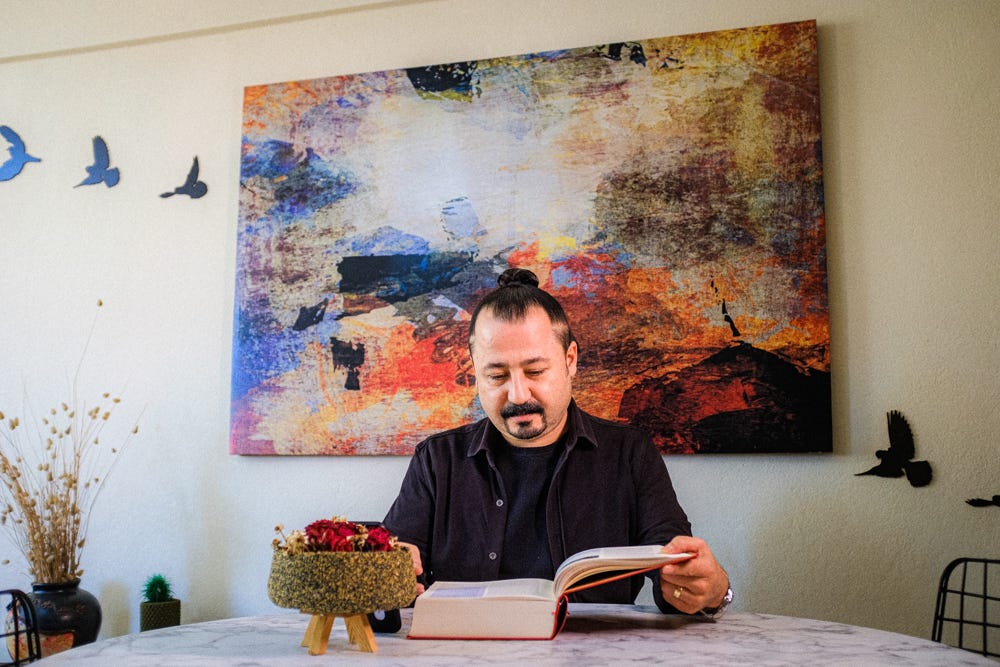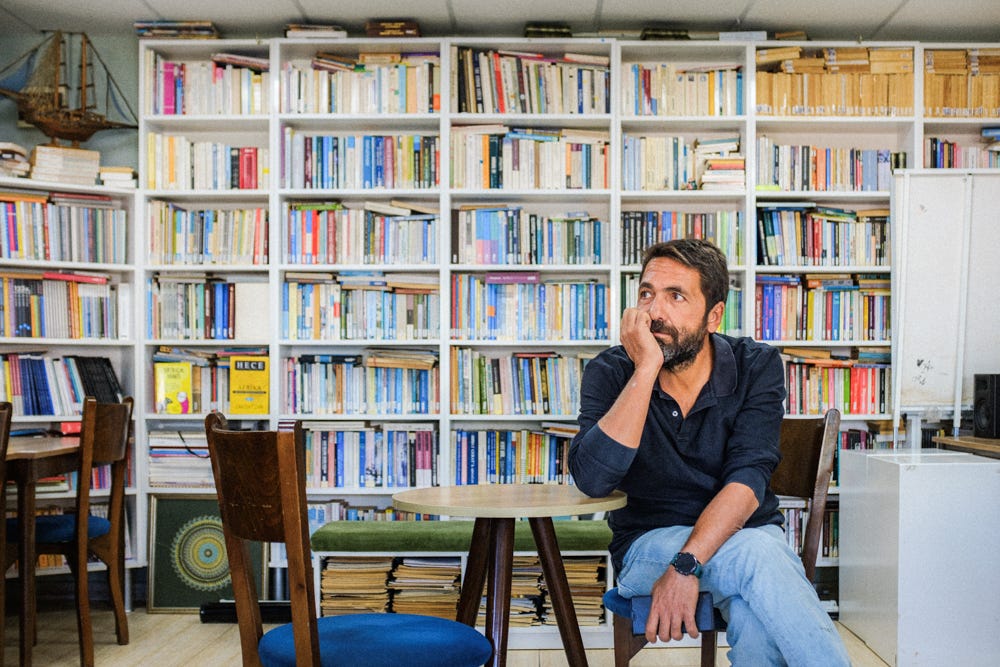Punished for taking a stance, Turkey’s peace academics watch new ‘Kurdish opening’ with reservations
MERSİN — It has been seven weeks since Devlet Bahçeli, Turkey’s ultranationalist party leader, shook hands with pro-Kurd DEM Party politicians, signaling the beginning of a new period in a decades-long conflict.
And it has been eight years since Ulaş Bayraktar signed a petition that drastically changed his life. He was one of 1,128 academics who, in 2016, objected to the Turkish army’s offensive against the Kurdistan Workers' Party (PKK), a Kurdish armed separatist group. The conflict was primarily centered in the nation’s southeast and came at a devastating cost for civilians caught in urban warfare between 2015 and 2016.
The signatories became known as Academics for Peace – a group of scholars who paid a heavy price for their anti-war stance. According to their website, 549 scholars were forced to leave their jobs after signing a peace petition, including 13 Ph.D holders and 97 professors. Four scholars were jailed, and 70 were detained.
Among those dismissed by presidential decree was Bayraktar, a doctor of administrative sciences at Mersin University. He immediately teamed up with two dismissed colleagues to start a new project, and not far from their old work place.
In 2017, the trio founded Kültürhane, a library, cafe and a hub for culture, discussions, trivia and film screenings – all hosted with coffee and their menu special: professor’s lemonade.
At its temporary spot, inside the yard of a sports complex in this coastal Mediterranean city, it has modest outdoor seating, newborn kittens sleeping in the shade and a library named after one of the late signatories. In an increasingly repressive environment targeting free speech, Kültürhane became a shelter for many seeking intellectual continuity, solidarity and defiance.
“We continued working with students on their theses here, but we didn’t meet them as professors. There was always a sense of equality from the beginning,” Bayraktar said. “I learned to make pastries, edit videos. We all served tea, cleaned toilets, kept accounting records.”
Bayraktar’s signature on the 2016 petition was especially noteworthy as he had lost his father, a captain in the Turkish Armed Forces, during a Kurdish militant attack in 1980. Despite this, he said he believes in peace, but thinks that peace is a matter of having the right ecosystem, and cannot be imposed top-down.
Like other academics who spoke to Turkey recap, Bayraktar shrugs at the latest ‘Kurdish opening’, a nascent peace proposal initiated by Nationalist Movement Party (MHP) chair Bahçeli last month.
As a close ally of Turkish Pres. Recep Tayyip Erdoğan, Bahçeli invited PKK leader Abdullah Öcalan to announce a ceasefire inside the Turkish parliament in exchange for his release from prison on İmralı island, where he has been held for 25 years.
The unexpected offer shocked the nation, and came soon after rattling news of a ‘newborn gang’ scandal, a wave of femicides and rising child abuse cases, all of which put pressure on the governing alliance to act against a growing sense of impunity in the nation.
“I don’t really believe in the recent talks about peace because the ecosystem is not right,” Bayraktar said. “Maybe the opposite of war is not peace, but justice.”
Following the collapse of previous ‘peace talks’ between the Turkish state and the PKK, up to half a million people were driven from their homes and over 2,000 people were killed over a 17-month period of conflict, according to a report by the Office of the United Nations High Commissioner for Human Rights (UNHCR).
Also eight years ago, widely popular pro-Kurd politician Selahattin Demirtaş, whose appeal went beyond Kurdish voters, was jailed along with other politicians and remains behind bars today.
“I had reservations about the past peace process, and I have reservations now,” Bayraktar said.
War and the 2015 elections
In March 2015, Öcalan called on PKK militants to lay down their arms against the Turkish state. Three months later, the fragile peace process that had lasted over two years collapsed following Turkey’s general elections in June.
“Give us 400 representatives, and this will be resolved peacefully,” Erdoğan said before the vote, referring to the parliamentary majority he sought in order to change the constitution and install the current presidential system – a bid that initially failed, before passing by public referendum in 2017.
After Erdoğan’s Justice and Development Party (AKP) lost its parliamentary majority in the June results, snap elections were called amid spiraling violence.
First, an Islamic State attack in Suruç, Şanlıurfa, killed 34 socialists who wanted to go to the war/torn Kurdish town of Kobani across the border in Syria. Then, on Jul. 22, in the border town of Ceylanpınar, two Turkish policemen were killed, marking the start of a bloody escalation between the Turkish state and the PKK once more.
By Aug. 12, the Kurdistan Communities Union (KCK) declared autonomous regions across Turkey’s Kurdish-majority areas, further fueling unrest. The peace process had failed, people on both sides well understood.
On Nov. 1, snap elections were held in the shadow of the widening conflict. The results ended more favorably for the AKP, which had regained a parliamentary majority. Yet a growing number of reports began to trickle out of the southeast, where cities and provinces were under round-the-clock curfews as military operations continued.
Many in Turkey watched the ongoing upheaval in fear. But a group of academics decided they could not remain quiet.
The petition and the backlash
About six months into the escalation, on Jan. 11, 2016, more than 1,000 Turkish academics boldly criticized the government alliance.
"We demand an immediate end to the violence the state is inflicting on its citizens. As academics and researchers of this country, we declare that we will not remain silent and be complicit in this massacre,” they wrote.
The petition accused the government of forcibly displacing Kurdish citizens, of committing an intentional massacre, and demanded that international groups be allowed to investigate the war-torn areas without obstruction.
It also called for creating a roadmap addressing Kurdish demands for a lasting, peaceful resolution to the conflict, which has killed more than 40,000 people since the mid-1980s.
The government’s response was swift and harsh. The petitioners were branded as traitors, accused of supporting terrorism. Many, including Ulaş Bayraktar, faced disciplinary actions, dismissals from their universities and criminal charges.
Erdoğan, who consolidated governing powers after the failed coup later that year, publicly labeled the academics as “enemies of the state.”
For many of the signatories, the aftermath of the petition meant a life in exile. Universities purged hundreds of academics under state of emergency decrees, which bypassed the parliament and became effective immediately.
Some scholars fled abroad, continuing their research and advocacy from distant countries, while others stayed behind, navigating social, economic and travel restrictions in an increasingly authoritarian environment.
“They were looking for reasons to dismiss us before the petition. We basically gave them a list of people to remove,” Bayraktar said.
After 6.5 years of legal battles, Bayraktar was able to return to work in the spring of 2023.
“It was tough. But here in Mersin, we didn’t face isolation like our colleagues did in Düzce,” he said, referring to the Black Sea province, where signatories were subjected to threats and deep social isolation. “Instead, locals of Mersin embraced us and Kültürhane.”

The cost of speaking out
Meanwhile, Taylan Koç, who taught political science at Çukurova University in Adana, said he is still suffering the mental and emotional toll of the backlash. He hasn’t been able to return to work and his legal battles continue.
During an interview at his wife’s law office in Adana, Koç said his life changed dramatically after putting his name on the petition. He, like other signatories, was tried under anti-terrorism laws.
“People barely say hello,” Koç said. “Our close friends stopped talking to us. This hurt me a lot.”
Responding to criticism of bias in the peace petition, which was addressed solely to Turkish authorities and not to the PKK, Koç said that as a Turkish citizen, he sought to address his own state and “not a terrorist group” in making a call for a ceasefire.
“Had I not been dismissed, I would have been a professor for five years by now,” Koç continues. He was placed under an international travel ban until he was acquitted of terror charges, but he said he had never planned to leave Turkey in the first place.
Over the years, he edited books, translated texts and studied law remotely to work with his wife. He said he had to sell the family car, and had been through very dim times as his wife became pregnant with their son shortly after his dismissal.
Though the hardest part for him, came with the suicide of his colleague and friend, Mehmet Fatih Tıraş.
“He was like my brother. He left a note behind that said: ‘They took everything from me,’” Koç recalled, his voice thick with emotion.
Tıraş taught econometrics at Çukurova University and was one of the signatories. He committed suicide weeks after his dismissal.
“They erased one generation of scholars from this country,” Koç said. “Academia continues in disgrace. People who shouldn’t even be allowed on campuses are teaching. Meanwhile, qualified scholars went abroad.”
Academia in decline
According to Freedom House’s annual index of civil liberties within countries: “Academic freedom, never well respected in Turkey, was weakened further by the AKP’s purge of government and civil society workers after the 2016 coup attempt.”
The government and university administrations, the monitoring group says, routinely intervene to prevent academics from researching sensitive topics, and encourages self-censorship among scholars. In 2018, Erdoğan centralized the power to appoint rectors at public and state universities, which the nation’s top court in June of this year ruled as unconstitutional.
Ziynet Özçelik, a lawyer who took dozens of cases for dismissed academics, said her motivation stems from her belief in the importance of academic freedom and freedom of expression, and that as a lawyer, it’s her duty to correct judicial wrongdoing.
Explaining that signatories were sued individually rather than under a single case, Özçelik said that every academic’s story is different.
“Some have been able to return to their jobs, while many have not,” she said. “And there are cases in which they returned to their jobs, but the court reversed the decision, and they were removed once again.”
After years of legal battles, no signatories remain in jail today, but for many, what they have lost is difficult to replace.
Selim Çakmaklı, who taught economics at Mersin University, said it’s been eight years since he’s seen his children, who live in Mersin with their mother, his wife.
“It was the worst decision of my life. Leaving by myself into an unknown on New Year’s Eve,” months after he signed the petition, he said.
Çakmaklı has been living in the United States since 2017, and teaches at Rutgers University in New Jersey.
“I’m following the news in Turkey, and I want to be optimistic,” he said about the recent developments. “But our education system has just lost so much that it’s hard to be.”
According to the Europe-based monitoring project Academic Freedom Index’s 2023 report, Turkey ranked 166 out of 179 countries, falling in the same category as North Korea and just ahead of Afghanistan under Taliban rule.
This newsletter is supported by readers via Substack and Patreon. Paid subscribers get full access to our recaps, reports, members-only chat and news tracking tools. All proceeds go towards sustaining our journalism.
Turkey recap is produced by the Kolektif Medya Derneği (KMD), an İstanbul-based non-profit association founded by our editorial team to support and elevate news media and journalists in Turkey. Contact us: info@turkeyrecap.com
Diego Cupolo, Editor-in-chief @diegocupolo
Gonca Tokyol, Editor-at-large @goncatokyol
Ingrid Woudwijk, KMD president @deingrid
Emily Johnson, Deputy editor @emilyjohnson
Damla Uğantaş, Tr Türkçe editor @damlaugantas
Azra Ceylan, Economy reporter @azraceylani
Dénes Jäger, Editorial intern @denesjager



